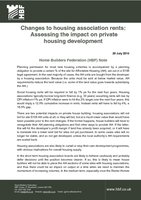Planning permission for most new housing schemes is accompanied by a planning obligation to provide a certain % of the site for Affordable Housing (AH), set out in a S106 legal agreement. In the vast majority of cases, the AH units are bought from the developer by a housing association. Because the units must be sold at below market value, AH requirements reduce the land value (i.e. some of the land value goes towards subsidizing the AH.)
Social housing rents will be required to fall by 1% pa for the next four years. Housing associations typically borrow long-term finance (e.g. 30 years) assuming rents will rise by CPI inflation+1% pa. If CPI inflation were to hit the 2% target over the next four years, this would imply a 12.5% cumulative increase in rents. Instead rents will have to fall by 4%, a 16.5% gap.
There are two potential impacts on private house building: housing associations will not bid for site S106 AH units at all; or they will bid, but at a much lower value than would have been possible prior to the rent changes. If the former happens, house builders will have to renegotiate their AH planning obligations and find other ways to provide AH. If the latter, this will hit the developer’s profit margin if land has already been acquired, or it will have to translate into a lower land bid for sites not yet purchased. In some cases sites will no longer be viable, and so not get developed, unless the local authority’s AH requirements are scaled back.
Housing associations are also likely to curtail or stop their own development programmes, with obvious implications for overall housing supply.
In the short term housing association boards are likely to behave cautiously and probably defer decisions until the position becomes clearer. If so, this is likely to mean house builders will not be able to place the AH sections of some sites with housing associations, and thus there could be an impact on output at a time when we need to maintain the momentum of increasing volumes. In the medium term, especially once the Starter Homes scheme can be introduced onto sites, the situation may recover. However we may need interim transitional arrangements to prevent any reduction in output in the shorter term.
It is far too early to judge the eventual outcome of the policy change and its impact on private house builders. Many of the details have not yet been determined and housing associations have not had time to assess the likely full impact. However the consequences are potentially very significant.
HBF is contacting the CEOs of its major members to seek their early reaction. However we will have to continue discussing the policy’s actual impact over the coming months. HBF also holds regular meetings between its member AH experts and the HCA. This group will monitor the situation as it evolves. And we have a number of housing association members whom we will contact to assess their views.
Another major consideration is the Starter Homes initiative and its interrelationship with AH. There is much detail yet to be determined, but the initiative is likely to be closely linked to the evolving AH situation.
As of today we cannot draw any firm conclusions. However, given the potential importance of the changes to housing association finances to private housing development, HBF will need to monitor the situation very closely for the rest of this year and beyond. And, as noted, we may need transitional arrangements to prevent any short-term fall in output.
John Stewart
Director of Economic Affairs
